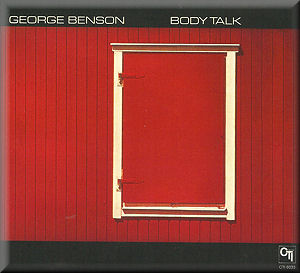1. Dance
2. When Love Has Grown
3. Plum
4. Body Talk
4. Top of the World
5. Body Talk (alternate take)
George Benson, Earl Klugh - Guitars
Ron Carter - Bass
Gary King - Electric bass
Jack DeJohnette - Drums
Mobutu - Percussion
Harold Mabern - Electric piano
Gerald Chamberlain, Dick Griffin - Trombones
Jon Faddis, John Gatchell, Waymon Reed - Trumpets, flugelhorns
Frank Foster - Tenor sax
Following my review of a Hubert Laws CD, here is another reissue of an album from the CTI organisation, which almost patented "smooth jazz" before that phrase became popular. Certainly producer Creed Taylor specialised in a form of easy-listening jazz where the jazz element was usually enhanced, not submerged, by the lush backings.
The CD has only five tracks - plus an alternate take of the title-track - and it lasts for a mere 46 minutes. Yet George Benson is a class artist, and he is presented here as a jazz guitarist rather than as the singer that he predominantly became in later years. As all the arrangements were written by Pee Wee Ellis, most famous as a member of James Brown's band, most tunes have at least a hint of rhythm-and-blues, but Benson is adept at playing in this style. The opening Dance has a jigging Latin rhythm. George's improvisation occupies most of this track, which ends with just guitar and drums.
When Love Has Grown is slower and seductive, with George using chords to state the theme and what sounds like a brief solo from fellow guitarist Earl Klugh. Plum has quicksilver guitar from Benson and an exciting doubling of the tempo. It justifies Creed Taylor's approach: after all, why shouldn't jazz be pleasantly listenable - especially if it is technically brilliant?
The title-track brings in a horn section to vary the sound but the song has too many repetitive patterns and a thudding bass drum, although George's dextrous guitar overcomes some of the riffs. The Carpenters had a hit called Top of the World the year that this album was recorded (1973), but the tune here is a Benson original which he caresses lovingly. The alternative take of Body Talk emphasises the Latin tinge and the brass accompaniment, but there is still too much repetition.
This is not the best Benson jazz album (for that, try The George Benson Cookbook) but it makes agreeable listening.
Tony Augarde
www.augardebooks.co.uk
